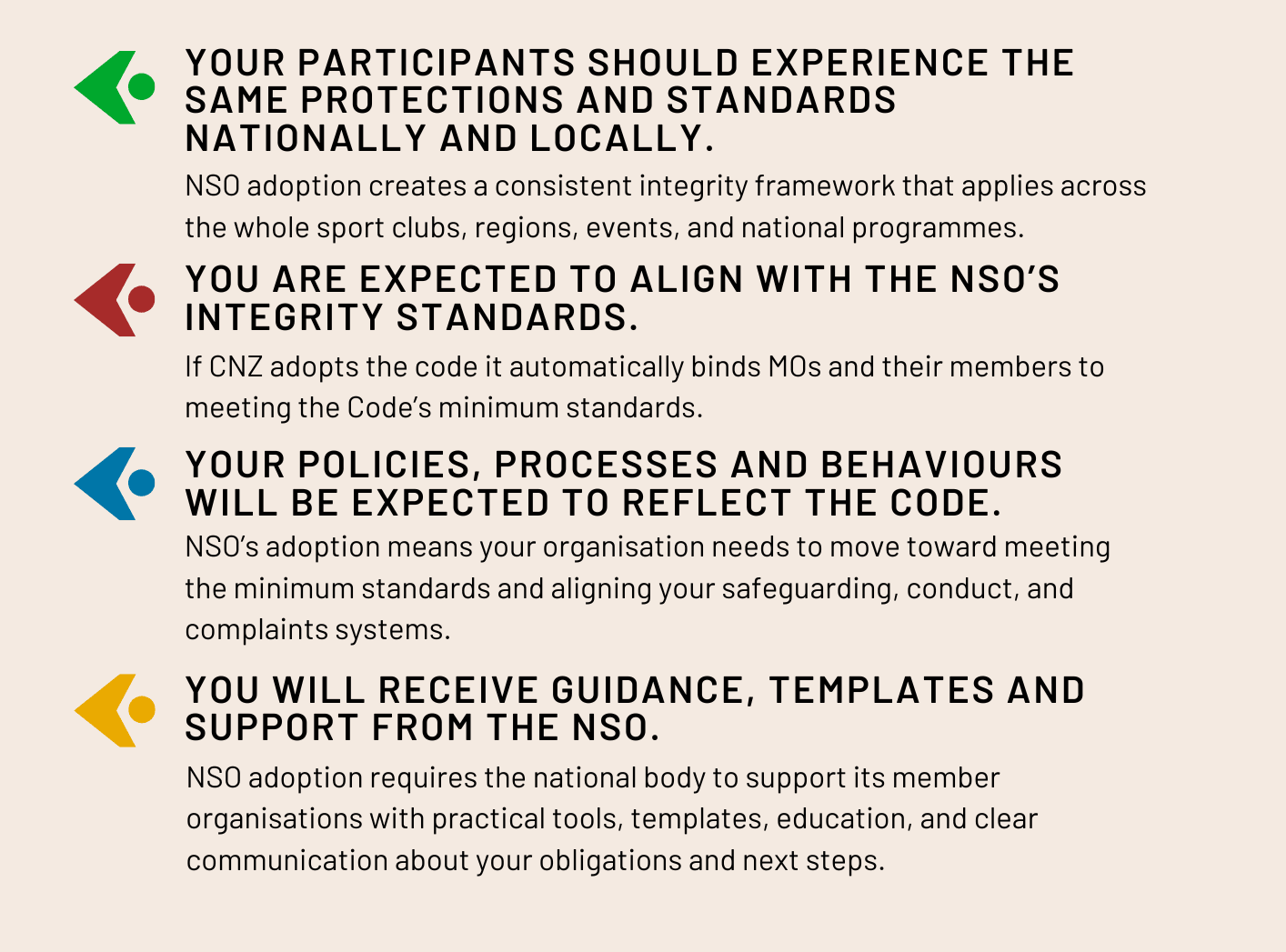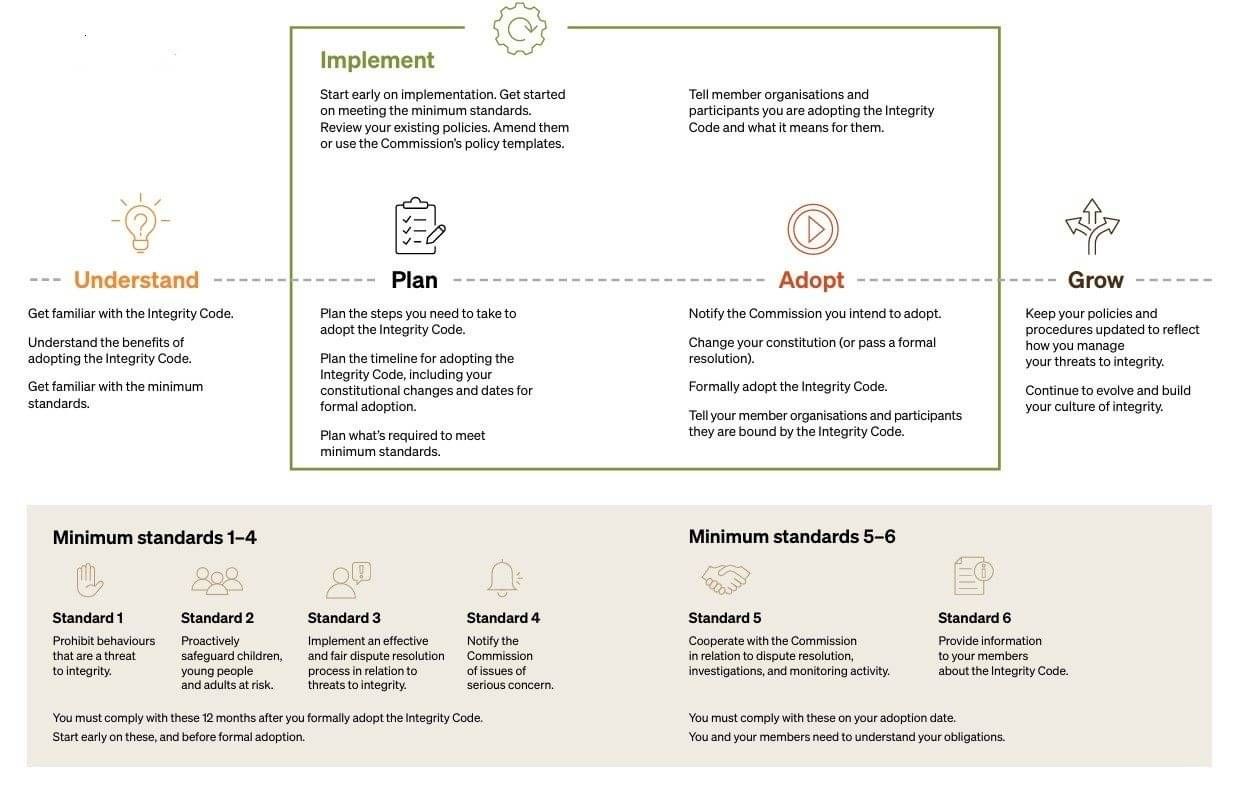Code Adoption Support Hub
About This Hub
This space has been created to support Member Organisations (MOs) as they work through the process of adopting, aligning with, and implementing the Code of Integrity for Sport and Recreation (the Integrity Code).
Our goal is to provide clear guidance, practical tools, and consistent messaging so that every member organisation can confidently understand what is required and how to take the necessary steps.
What Does Adoption Mean for CNZ Member Organisations (MOs)
If an NSO (such as Cycling New Zealand) adopts the Integrity Code, that adoption has important implications for you as a Member Organisation:

Steps To Adoption
Step 1- Review the Code
Begin by reading the Code in full, including the minimum standards, definitions, and expectations. Make sure your committee, key volunteers, coaches, and board/committee members understand what adoption means and what obligations your organisation will take on. Consider attending any CNZ or Commission briefing session if offered.
Step 2- Audit
Review current integrity related policies, systems, and practices against the national Integrity Code standards.
Step 3- Confirm Adoption Approach
Amend your constitution or equivalent governing document; or
Make a formal resolution, in accordance with its constitution or equivalent governing document.
Organisations adopting the Code and embedding it into their constitution should refer to the Sport NZ Template for Regional Sports Organisations, specifically clause 15.1, to ensure alignment with best-practice governance requirements.
Step 4- Update Policies
Based on your audit, either:
adopt CNZ’s policies, or
adapt the Integrity Commission Template polices, or
update your existing policies ensuring they meet the codes minimum standards.
Below is a list of the policies your organisation will need to adopt, review, or update as part of aligning with the Integrity Code.
Member Organisations may choose to adopt Cycling New Zealand’s policies directly as a practical and efficient way to meet integrity expectations, provided this decision is formally recorded and clearly communicated to members on their website.
If adopting CNZ policies, organisations must ensure these policies are fit for purpose for their local context, cover their full membership, and include any additional procedures needed at club or regional (such as who receives and manages complaints). Adopting CNZ does not remove an MO’s responsibility to meet its obligations under the Integrity Code, and committees must still ensure that CNZ policies align with how they operate, that any gaps are addressed, and that updates to CNZ policies are communicated promptly to members.
Prohibited Behaviour Policy
CNZ Policy
Child Protection Policy
CNZ Policy
Safeguarding Policy
CNZ Policy
Complaints and Disputes Resolution Policy
CNZ Policy
Disciplinary Policy
CNZ Policy
Mandatory Notification Policy
CNZ Policy
Privacy Policy
Step 4 (part 2)- Safe Practices
Under minimum standard 2- organisations should assess potential risk areas, identify and document safe practices, and ensure these expectations are clearly communicated across their community.
Templates
Step 5- Define Roles
Clarify who in your organisation does what. Identify roles such as:
Integrity Adoption Lead
Complaints Manager or panel
Safeguarding Contact
Board/Committee lead for integrity
As per minimum standard 2- the requirement to appoint a safeguarding lead at a national or regional level
Recommendation to appoint a board/committee member and operational staff member (if you have staff) to lead this work together. This will help ensure the necessary skills and resources are directed towards adoption and implementation.
Step 6- Communicate
As per Minimum standard 6: Provide information to your members about the Integrity Code: Your organisation must provide information to help its members and participants understand and implement the Integrity Code. This includes:
What the Code is and why it is being adopted
Key dates and implementation timelines
What it means for clubs
Informing them they are bound to the Integrity Code
Access to any policy that implements the Integrity Code.
Here are some examples you can include:
Posters and signage at clubrooms, venues, and event spaces
Social media posts (videos, announcements)
Website updates (news articles)
Email newsletters to members, volunteers, parents, and coaches
Webinars or online information sessions explaining what the Code is and what changes to expect
In-person briefings at AGMs, committee meetings, coach meetings, or event briefings
Step 7- Learning and Development
Ensure all integrity-related learning (e.g., safeguarding, prohibited behaviour, complaints handling) is implemented & monitored.
Strengthen onboarding processes to ensure safety checks and training are embedded and tracked.
As required under Minimum Standard 2, specified persons must complete the relevant education and training,
Specified persons are also required to undergo official background and criminal record checks (e.g., police vetting).
Step 8- Update Website
Ensure your website contains:
a statement confirming adoption
clear links to your policies (or CNZ’s, if adopted)
how members can make a complaint
who to contact for safeguarding or integrity concerns
links to the Integrity Code

FAQ
What is does Integrity mean?
Integrity in sport and recreation is the quality of being honest, trustworthy, and ethically principled – doing what’s right even when no one is watching. It underpins a culture of integrity, which is an environment built on shared values and a firm commitment to high standards of behaviour that promote safety, fairness, and inclusion. In practical terms, it means organisations and individuals in sport must safeguard participants’ wellbeing, reject abuse and corruption, support transparency, and respond appropriately when things go wrong. From more information on what integrity is check here.
Why adoption matters
Adopting the integrity code ensures that all participants experience safe, inclusive, and fair sporting environments. It strengthens your organisation’s integrity framework, clarifies expectations, and provides a nationally aligned approach to integrity matters across the sector.
What does code adoption mean?
Adopting the Integrity Code means formally committing your organisation to a set of minimum standards that promote safety, fairness, and respect across sport in Aotearoa. It demonstrates that your organisation takes integrity seriously and is committed to providing a safe and positive experience for all participants.
Do we need to change our constitution?
Not always. Some organisations choose to reference the Code within their constitution, while others adopt it at a policy level. Both approaches can be effective.
Will education on the code be provided?
Yes, sector-wide education opportunities will be communicated by the Commission and CNZ. Your organisation should also share these opportunities with your community.
What if a complaint occurs before we finish adoption?
You can continue to use your existing processes while transitioning. Support is available if you need guidance either from CNZ or the Integrity Commission.
Support
Cycling New Zealand
Integrity Commission
Tony Coughlan
Sport Integrity Commission
Cycling Integrity Relationship Manager
0274959482
What learning could look like for different roles
Coaches/Volunteers
Identifying and responding to abuse
Identifying and responding to harassment
Identifying and responding to violence
Identifying and responding to sexually harmful behaviour
Identifying and responding to bullying
Identifying and responding to corruption and fraud
Identifying and responding to grooming
Tips for safer online communication
Protecting again competition manipulation
Safeguarding and protecting young people
Tips for coaching and instructing
Safeguarding children while travelling
Staff
Making changing rooms and facilitates safer
Tips for safer online communication
Protecting against competition manipulation
Safeguarding and protecting young people
Safeguarding children while travelling
Reducing risks when taking and sharing images
Identifying and responding to abuse
Identifying and responding to harassment
Identifying and responding to violence
Identifying and responding to sexually harmful behaviour
Identifying and responding to bullying
